Psalm 23 is one of the most well-known and beloved songs from the Bible. It was written by David, likely late in his life as he looked back over his long walk with the Lord. Though his sheepherding days were far behind him, he drew upon his expert knowledge and experience in caring for sheep to describe his relationship with his Lord, the Good Shepherd (John 10:11).
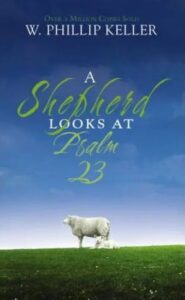
Though many books have been written about Psalm 23, W. Phillip Keller’s book A Shepherd Looks at Psalm 23 contains unique insights from the shepherd’s life he shared with David. Keller grew up in East Africa surrounded by sheepherders and later made his living as a sheep owner and sheep rancher for about eight years. He understands explicitly the traits of sheep and all that is involved in being a good and caring manager of them.
In each of the twelve chapters, Keller elaborates on one of the phrases from the psalm. He shares a personal experience from his shepherding days that relates to the idea and helps the reader to understand David’s thinking as he wrote the psalm. Then he parallels the shepherd/sheep relationship with that of the Good Shepherd to us.
Here are a few of his insights:
“The Lord is my shepherd”
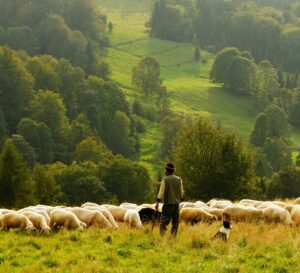
Keller helps us to see that Jesus has legitimate ownership of us and, therefore, has the right to be called our Shepherd. He recounts his first flock of 30 ewes that he purchased during the Depression with hard-earned money. Because he had paid a great price for them, he owned them and felt they were a part of him. If they were to flourish, he also had to continually lay his life down for them because sheep require “endless attention and meticulous care.”
Jesus has ownership of us because he chose to create us and, therefore, understands us like no one else can. He paid with his shed blood to have a relationship with us. And he continues to intercede for us, guide us, and work on our behalf so we will flourish.
“He makes me lie down in green pastures”
For sheep to be able to lie down and rest, Keller says they must be free from fear, tension, aggravations of flies and parasites, and hunger. It is only the shepherd who can release the sheep from these anxieties. The author goes into detail about each one, but I will just share the one addressing hunger.
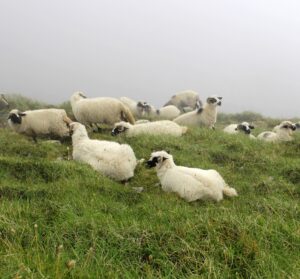
Sheep country is generally semi-arid because a dry climate presents fewer health hazards. Green pastures are not common, but they are essential. Therefore, a good shepherd will put in a great amount of time and labor to clear land, plow deeply, plant special grains, irrigate, and care for the crops. Without these places, sheep would always be on their feet, searching for food. Green pastures allow them to eat their fill and then rest quietly.
Keller says today Jesus is providing green pastures for us by clearing away rocks of unbelief, tearing out roots of bitterness, breaking up the hard clay of a proud human heart, and sowing the seed of his Word, which can produce rich crops of contentment if we allow him to work in us.
“He restores my soul”
Even David, much loved of God, knew what it was like to be dejected, to experience defeat, to fall to temptation, to feel hopeless. He cried out, “Why are you downcast, O my soul? Why so disturbed within me?” (Psalm 42:11). Even David needed restoration.
“Cast down” sheep is an old English term a shepherd used for a sheep that has turned over on its back and can’t get up by itself. It will struggle and become frightened, and it is easy prey for predators. If the shepherd doesn’t come soon, the sheep will die. This is why a shepherd must look over his flock every day, counting them.

Keller would spend hours searching for a lost sheep. When he found a cast sheep, he would roll it over gently, lift it onto its legs, and rub its limbs to restore circulation, all while talking to it tenderly. He says many people think that when they get themselves into a spiritual dilemma, God becomes disgusted with them, but that is not at all the character of the Good Shepherd.
“Even though I walk through the valley of the shadow of death, I will fear no evil for you are with me”
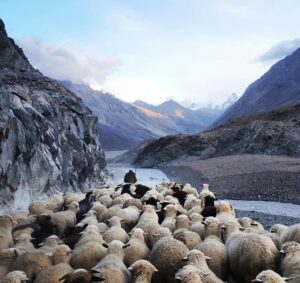
According to Keller, this verse marks a division of the year at which time the shepherd leads his sheep away from the home range up to mountain meadows. The shepherd knows the best way to the top of the mountain is along the gulches and deep ravines. Even though there are dangers from predators and natural disasters such as flash floods, it is the gentlest route, it is well watered, and it has the richest food. During these months of being away from home, the sheep are entirely alone with their shepherd.
Our path to moving higher with God, growing closer to him, also climbs through valleys. He knows all the dangers and will sustain us through them. It is in our deep troubles that we discover him to be our refreshment. In the valley there is an intimacy with him that isn’t found anywhere else. Our closeness to him removes all fear.
“You anoint my head with oil”
By this place in the psalm, the sheep have reached the sublime setting of their summer mountain meadow, which the shepherd has prepared ahead of time so the sheep can enjoy clean springs, plentiful and healthy forage, and intimacy with their shepherd. However, for sheep, summertime poses the serious problem of insects.
One of the worst is the nose fly. They attempt to lay eggs in the nose. If successful, the larvae work their way into the sheep’s head where they burrow into the flesh and cause blindness. The irritation causes the sheep to beat their heads against trees and rocks. The hovering flies can send the sheep into panic, tossing their heads up and down for hours or racing around the pasture until they drop from exhaustion.
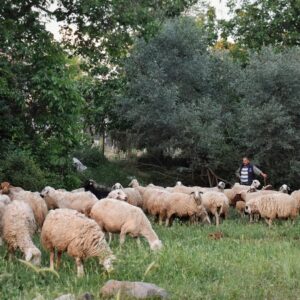
Keller constantly watched the behavior of his sheep. At the first sign of flies, he applied a solution over the nose and head of the sheep for protection. Their irritability would immediately change to contented eating and resting. Once was not enough, though; continuous applications were required.
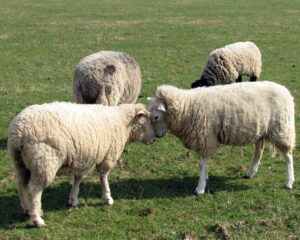
Another summertime torment for sheep is the highly contagious scab disease caused by a parasite and spread by direct contact. It is most common around the head. Sheep are affectionate and love to rub heads. As with flies, the only antidote is a solution of oils and chemicals. Even though the sheep are sometimes submerged in the solution, their heads need to be dipped repeatedly.
For us, Keller says the flies may be personality conflicts or petty annoyances that can become burning issues. Our scab disease is attitudes that damage us spiritually. Our thoughts, ideas, desires, and choices come through exposing our minds to the minds of other people, many of whom don’t have the mind of Christ.
For both aggravations and contaminating attitudes, the solution is the same: the “continuous anointing of God’s gracious Spirit.” The constant flow of this oil makes it possible for us to react calmly to annoyances and for the attitudes of Christ to grow in us.
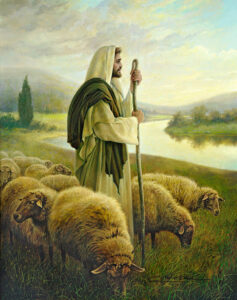
For me, the insights of the author’s personal shepherding experience gave me a new perspective on familiar phrases I’ve read for years. I have a deeper understanding of what was in David’s heart as he sang to the Lord. The great love David had had for his sheep he recognized in the Good Shepherd’s same sacrificial love for him.
While looking closely at the traits and behaviors of sheep, Keller challenges us to examine our own lives and how we relate to Jesus. His desire for the reader of this book is that “there will…emerge a growing admiration and affection for the Great Shepherd of his soul.” He most definitely has shown, chapter after chapter, reasons for us to admire and love Jesus and recognize him as our Good Shepherd.
Scripture quotations are from NIV.
Quotations other than scripture are from A Shepherd Looks at Psalm 23.
Feature photo by kailash kumar on Pexels

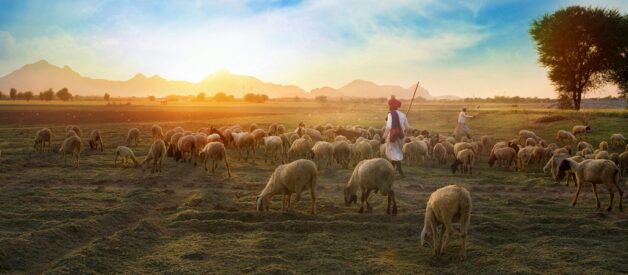


Brenda
June 5, 2024That’s so interesting! It truly does help the verses make more sense, like anointing our head with oil (though the nose flies made me cringe). And “cast down” sheep? Whoa. I’m glad I have a Shepherd who knows how to take care of me. 🙂
Bonnie
June 5, 2024Knowing the details of the life of shepherds and their sheep really does make the psalm come more to life. I was fascinated about the cast sheep. Here’s something else interesting about that, which I didn’t include. Keller gave three reasons sheep may become cast and how that relates to our lives. The sheep chooses a soft, rounded hollow in the ground to lie down in (we indulge ourselves in a life of comfort), it has too much wool, which weighs it down (we are weighed down by our old self-life, the accumulation of possessions and worldly ideas), or it is too fat (we have a sense of well-being because of our material success). That was certainly eye-opening!
Thanks for sharing, Brenda.
Angie Camp
June 5, 2024Bonnie, “I am the good shepherd” is one of my favorite “I Am’s” so I ordered Keller’s book…in large print! Thanks for exposing us to this book, Angie
Bonnie
June 5, 2024How cool! You are certainly welcome, Angie. Let me know what you think of the book.
marilyn
June 7, 2024Hi Bonnie,
I read this book many years ago, but could remember nothing I had read so many years later. Thank you for refreshing my memory about a truly awesome book. I’m going to try to find a copy to reread it. Thanks again.
Marilyn
Bonnie
June 7, 2024You are welcome, Marilyn. The book should be easy to find. I thought you might have read it. I think I remember you having a fondness for sheep. 🙂